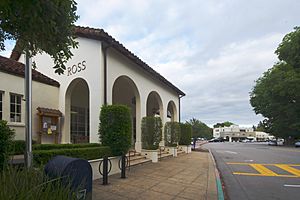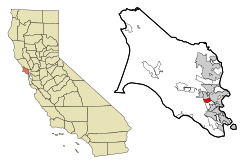Ross, California facts for kids
Quick facts for kids
Town of Ross
|
||
|---|---|---|

Post office on Ross Common
|
||
|
||

Location within Marin County
|
||
| Country | ||
| State | ||
| County | Marin | |
| Incorporated | August 21, 1908 | |
| Government | ||
| Area | ||
| • Total | 1.56 sq mi (4.0 km2) | |
| • Land | 1.56 sq mi (4.0 km2) | |
| • Water | 0.00 sq mi (0 km2) 0% | |
| Elevation | 36 ft (11 m) | |
| Population
(2020)
|
||
| • Total | 2,338 | |
| • Density | 1,500.6/sq mi (579.4/km2) | |
| Time zone | UTC−8 (PST) | |
| • Summer (DST) | UTC−7 (PDT) | |
| ZIP Code |
94957
|
|
| Area codes | 415/628 | |
| FIPS code | 06-62980 | |
| GNIS feature ID | 0277587 | |
Ross is a small town in Marin County, California. It is located just north of San Francisco. The town sits about 36 feet (11 meters) above sea level. In 2020, about 2,338 people lived there.
Ross is surrounded by other towns. To the east is San Rafael. To the south is Kentfield. San Anselmo is to the north. To the west is a protected natural area called the Mount Tamalpais watershed. The town is named after James Ross, who bought land here in 1859.
Contents
History of Ross
After the Mexican Revolution in 1821, land was given out in grants. This created what is now Marin County. Ross was once part of a large Mexican land grant. This grant was given to Juan B.R. Cooper in 1840.
In 1857, a man named James Ross bought a big piece of land for $50,000. James Ross was from Scotland. He came to San Francisco in 1848. He became rich in the business of selling drinks. He started a trading post called "Ross Landing." He built his home on Redwood Drive. He moved there with his wife and three children.
When James Ross died in 1862, his wife, Annie Ross, had to sell some land. She needed to pay each of their daughters $10,000. The part of the land that was left is what we know as the Town of Ross today.
The first post office in Ross opened in 1887. Ross officially became a town in 1908.
Where is Ross Located?
According to the United States Census Bureau, the town of Ross covers about 1.6 square miles (4.1 square kilometers). All of this area is land.
People of Ross
| Historical population | |||
|---|---|---|---|
| Census | Pop. | %± | |
| 1880 | 252 | — | |
| 1910 | 556 | — | |
| 1920 | 727 | 30.8% | |
| 1930 | 1,355 | 86.4% | |
| 1940 | 1,751 | 29.2% | |
| 1950 | 2,179 | 24.4% | |
| 1960 | 2,551 | 17.1% | |
| 1970 | 2,742 | 7.5% | |
| 1980 | 2,801 | 2.2% | |
| 1990 | 2,123 | −24.2% | |
| 2000 | 2,329 | 9.7% | |
| 2010 | 2,415 | 3.7% | |
| 2020 | 2,338 | −3.2% | |
| U.S. Decennial Census | |||
Ross Population in 2010
In the 2010 census, Ross had 2,415 people. Most people (93.8%) were White. About 1.9% were Asian. People of Hispanic or Latino background made up 3.9% of the population.
Most people (97.8%) lived in homes. There were 798 households in Ross. About 44.7% of these homes had children under 18. Many homes (72.1%) were married couples. The average household had about 2.96 people.
The median age in Ross was 45.1 years. About 30.3% of the people were under 18. About 17.1% were 65 or older.
Most homes (86.0%) were owned by the people living in them. About 14.0% of homes were rented.
Ross Population in 2000
In the 2000 census, Ross had 2,329 people. There were 761 households. Most people (90.9%) were White. About 1.9% were Asian. Hispanic or Latino people made up 3.9% of the population.
About 44.3% of homes had children under 18. Most homes (72.0%) were married couples. The average home had 2.94 people.
The median income for a household was $102,015. This means half of the households earned more, and half earned less. About 8.5% of the people lived below the poverty line.
Arts and Culture in Ross
Ross has some interesting landmarks. One is the Ross Bear sculpture. It was made by Beniamino Bufano. You can find it near the town hall. Another important place is the Marin Art and Garden Center.
Ross was even used in a movie! In 1972, the film The Godfather shot a scene at the Ross School. The town pretended to be New Hampshire for the movie.
Education in Ross
Students in Ross attend schools in two different districts. These are the Ross Elementary School District and the Tamalpais Union High School District.
Important schools in Ross include:
- The Branson School
- Ross School
Famous People from Ross
Many interesting people have lived in Ross. Some of them include:
- Signy Coleman, an actress
- Dylan Penn, a model
- Maria Pitillo, an actress
- Jack Woolams, a test pilot
- Isabella Worn, a garden designer
- Alan Sues, an actor and comedian
See also
 In Spanish: Ross (California) para niños
In Spanish: Ross (California) para niños




